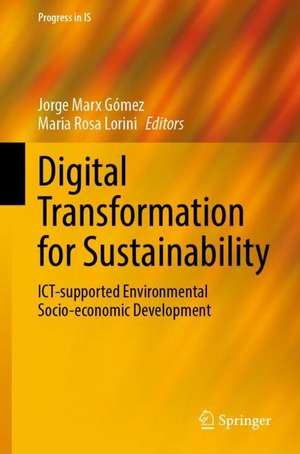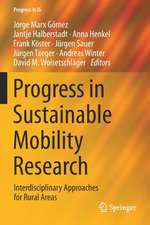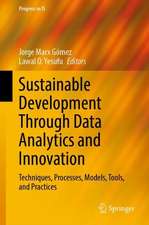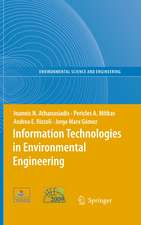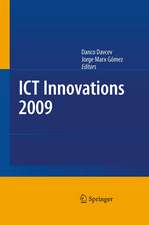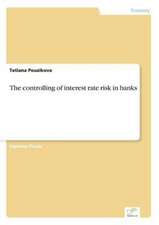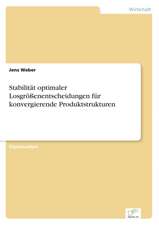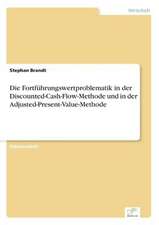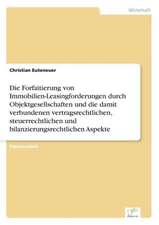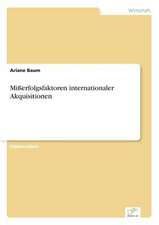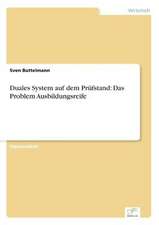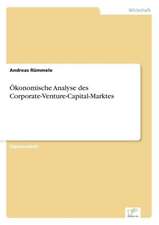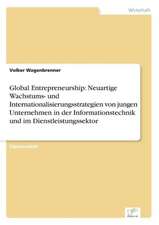Digital Transformation for Sustainability: ICT-supported Environmental Socio-economic Development: Progress in IS
Editat de Jorge Marx Gómez, Maria Rosa Lorinien Limba Engleză Hardback – 2 dec 2022
This book presents case studies to analyse the relationship between sustainability – environmental, social, institutional and economic – and digital innovation.
The respective contributions offer a contextualisation of the main present and future trends concerning these two elements, and present analyses from economic, technical, managerial, and social perspectives alike. The individual sections of the book focus on interactions between sustainability and digital innovation in existing organisations and highlight the new opportunities, challenges and threats that may emerge as a result. The contributions are mainly based on case studies and research conducted in Europe and Africa, with a few focusing on Southeast Asia and Central America, and were prepared by experts in the fields of Information Systems, Computer Science, Social Development, and Economics.
The respective contributions offer a contextualisation of the main present and future trends concerning these two elements, and present analyses from economic, technical, managerial, and social perspectives alike. The individual sections of the book focus on interactions between sustainability and digital innovation in existing organisations and highlight the new opportunities, challenges and threats that may emerge as a result. The contributions are mainly based on case studies and research conducted in Europe and Africa, with a few focusing on Southeast Asia and Central America, and were prepared by experts in the fields of Information Systems, Computer Science, Social Development, and Economics.
| Toate formatele și edițiile | Preț | Express |
|---|---|---|
| Paperback (1) | 1123.19 lei 43-57 zile | |
| Springer International Publishing – 2 dec 2023 | 1123.19 lei 43-57 zile | |
| Hardback (1) | 1129.52 lei 43-57 zile | |
| Springer International Publishing – 2 dec 2022 | 1129.52 lei 43-57 zile |
Din seria Progress in IS
- 15%
 Preț: 581.36 lei
Preț: 581.36 lei - 17%
 Preț: 360.70 lei
Preț: 360.70 lei - 20%
 Preț: 939.27 lei
Preț: 939.27 lei - 18%
 Preț: 1113.09 lei
Preț: 1113.09 lei - 18%
 Preț: 725.43 lei
Preț: 725.43 lei - 15%
 Preț: 586.88 lei
Preț: 586.88 lei - 18%
 Preț: 1113.09 lei
Preț: 1113.09 lei - 8%
 Preț: 564.89 lei
Preț: 564.89 lei -
 Preț: 395.25 lei
Preț: 395.25 lei -
 Preț: 385.62 lei
Preț: 385.62 lei - 24%
 Preț: 936.27 lei
Preț: 936.27 lei - 20%
 Preț: 331.08 lei
Preț: 331.08 lei -
 Preț: 388.13 lei
Preț: 388.13 lei - 15%
 Preț: 646.75 lei
Preț: 646.75 lei - 20%
 Preț: 566.19 lei
Preț: 566.19 lei - 15%
 Preț: 637.59 lei
Preț: 637.59 lei - 18%
 Preț: 844.08 lei
Preț: 844.08 lei - 24%
 Preț: 802.97 lei
Preț: 802.97 lei - 20%
 Preț: 547.09 lei
Preț: 547.09 lei - 15%
 Preț: 644.30 lei
Preț: 644.30 lei -
 Preț: 385.25 lei
Preț: 385.25 lei - 18%
 Preț: 1251.68 lei
Preț: 1251.68 lei - 20%
 Preț: 314.39 lei
Preț: 314.39 lei -
 Preț: 386.61 lei
Preț: 386.61 lei -
 Preț: 383.50 lei
Preț: 383.50 lei -
 Preț: 382.75 lei
Preț: 382.75 lei - 15%
 Preț: 644.95 lei
Preț: 644.95 lei - 15%
 Preț: 652.64 lei
Preț: 652.64 lei - 18%
 Preț: 954.62 lei
Preț: 954.62 lei - 18%
 Preț: 784.13 lei
Preț: 784.13 lei - 18%
 Preț: 726.69 lei
Preț: 726.69 lei - 15%
 Preț: 646.11 lei
Preț: 646.11 lei - 15%
 Preț: 636.80 lei
Preț: 636.80 lei - 20%
 Preț: 584.18 lei
Preț: 584.18 lei - 15%
 Preț: 658.55 lei
Preț: 658.55 lei - 15%
 Preț: 589.14 lei
Preț: 589.14 lei - 20%
 Preț: 986.01 lei
Preț: 986.01 lei -
 Preț: 421.34 lei
Preț: 421.34 lei - 20%
 Preț: 336.35 lei
Preț: 336.35 lei - 20%
 Preț: 337.00 lei
Preț: 337.00 lei - 15%
 Preț: 644.95 lei
Preț: 644.95 lei
Preț: 1129.52 lei
Preț vechi: 1377.45 lei
-18% Nou
Puncte Express: 1694
Preț estimativ în valută:
216.13€ • 226.27$ • 178.84£
216.13€ • 226.27$ • 178.84£
Carte tipărită la comandă
Livrare economică 07-21 aprilie
Preluare comenzi: 021 569.72.76
Specificații
ISBN-13: 9783031154195
ISBN-10: 3031154193
Pagini: 597
Ilustrații: XXII, 597 p. 1 illus.
Dimensiuni: 155 x 235 mm
Greutate: 1.04 kg
Ediția:1st ed. 2022
Editura: Springer International Publishing
Colecția Springer
Seria Progress in IS
Locul publicării:Cham, Switzerland
ISBN-10: 3031154193
Pagini: 597
Ilustrații: XXII, 597 p. 1 illus.
Dimensiuni: 155 x 235 mm
Greutate: 1.04 kg
Ediția:1st ed. 2022
Editura: Springer International Publishing
Colecția Springer
Seria Progress in IS
Locul publicării:Cham, Switzerland
Cuprins
Part 1. Innovative ICT Solutions for Sustainable Citizenship.- Chapter 1. Addressing Sustainability Challenges of the South African Wine Industry Through Blockchain-related Traceability.- Chapter 2. Information Technology Infrastructure Sharing Effects on the Environment and the Delivery of Equitable Public Services in Zimbabwe.- Chapter 3. A Model for Smart Banking in Mauritius.- Chapter 4. MoPo Sane – Mobility Portal for Health Care Centres.- Part 2. Sustainable Entrepreneurship in the Framework of ICT.- Chapter 5. Computer Technologies for Promoting Women Entrepreneurship Skills Capability and Improved Employability.- Chapter 6. Independent Power Supply Through Off-grid Microgrids in South Africa: Potentials of AI Enhanced Business Models.- Chapter 7. Sustainable Digital Entrepreneurship: Examining IT4Sustainability as Business Development Path.- Part 3. Digital Transformation for Sustainability in Smart Cities.- Chapter 8. ECOSense and Sniffer Bike: European Bike Sensor Applications and Its Potential to Support the Decision Making Process in Cycling Promotion.- Chapter 9. Success Factors for Measuring Smart Campus Data Initiatives: A Response to Sustainable Transformation at Higher Education Institutions.- Chapter 10. Introducing a New Car-sharing Concept to Build Driving Communities for Work-commuting.- Chapter 11. A Framework for Social Urban Water Management.- Chapter 12. Leakage Detection and Automatic Billing in Water Distribution Systems Using Smart Sensors.- Chapter 13. E-government Initiatives Towards Smart City Development in Developing Countries.- Chapter 14. Greening the Transportation Landscape: Towards Low-carbon Vehicular Emissions in Ghana.- Chapter 15. The Socio-technological Value to Stakeholders of Smart City Initiatives That Address Urbanisation Challenges.- Part 4. Data Analytics for Sustainability.- Chapter 16. Development of a Quantitative Validation of Valuation Methods for Power Plants and Energy Systems Using a Simulation-based Benchmark.- Chapter 17. An Expert Review of the Social Media Analytics Framework for Citizen Relationship Management.- Chapter 18. Complexity of Epidemics Models – a Case-study of Cholera in Tanzania.- Chapter 19. Structured and Targeted Communication as an Enabler for Sustainable Data Science Projects.- Part 5. ICT at the Service of Sustainable Agriculture.- Chapter 20. Network Analysis on Artificial Intelligence in Agriculture, a Bibliometric Review.- Chapter 21. Enhancing Diversified Farming Systems by Combining ICT-based Data Collection and Behavioral Incentives: Potentials for South African Agroforestry.- Chapter 22. Information as a Service Communication Framework for Dairy Farmers.- Chapter 23. Understanding the Agricultural Input Information Needs and Seeking Behaviour of Small-scale Farmers: A Case of Koulikoro Region in Mali.- Part 6. Cross-cutting Themes.- Chapter 24. Safety and Ergonomics Indexes Applied to Sustainable Supply Chain Evaluation: A Systematic Literature Review.- Chapter 25. Ramifications of Ease-of-use, Access to and Acceptance of 4IR Technologies in Science Teacher Preparation.- Chapter 26. Analyzing Environmental Risks for Sustainable Supply Chains – a Geospatial Analytics Approach.- Chapter 27. Extending Common Alerting Protocol (CAP) System to Disseminate Extreme Weather Warnings to a Wider Population in Tanzania.- Chapter 28. Socio-technical Cyber Resilience: A Systematic Review of Cyber Resilience Management Frameworks.
Notă biografică
Prof. Dr. Jorge Marx Gómez is full Professor and Chair of Business Information Systems at Carl von Ossietzky University Oldenburg, Germany. His research interests include very large business applications, business information systems, federated ERP-systems, business intelligence, data warehousing, interoperability and environmental management information systems.
Dr. Maria Rosa Lorini is a research assistant at Royal Holloway, University of London, United Kingdom and project manager with extensive experience in the use of information and communication technology for the purpose of community empowerment. She has driven numerous hands-on programmes in underserved areas in Sub-Saharan Africa while working with international organisations and while pursuing her Ph.D in Information and Communication Technologies for Development.
Dr. Maria Rosa Lorini is a research assistant at Royal Holloway, University of London, United Kingdom and project manager with extensive experience in the use of information and communication technology for the purpose of community empowerment. She has driven numerous hands-on programmes in underserved areas in Sub-Saharan Africa while working with international organisations and while pursuing her Ph.D in Information and Communication Technologies for Development.
Textul de pe ultima copertă
This book presents case studies to analyse the relationship between sustainability – environmental, social, institutional and economic – and digital innovation.
The respective contributions offer a contextualisation of the main present and future trends concerning these two elements, and present analyses from economic, technical, managerial, and social perspectives alike. The individual sections of the book focus on interactions between sustainability and digital innovation in existing organisations and highlight the new opportunities, challenges and threats that may emerge as a result. The contributions are mainly based on case studies and research conducted in Europe and Africa, with a few focusing on Southeast Asia and Central America, and were prepared by experts in the fields of Information Systems, Computer Science, Social Development, and Economics.
The respective contributions offer a contextualisation of the main present and future trends concerning these two elements, and present analyses from economic, technical, managerial, and social perspectives alike. The individual sections of the book focus on interactions between sustainability and digital innovation in existing organisations and highlight the new opportunities, challenges and threats that may emerge as a result. The contributions are mainly based on case studies and research conducted in Europe and Africa, with a few focusing on Southeast Asia and Central America, and were prepared by experts in the fields of Information Systems, Computer Science, Social Development, and Economics.
Caracteristici
Features case studies from Europe and, especially, Sub-Saharan Africa Assesses the practical and research-oriented aspects of using ICT to support sustainability efforts Highlights the impact of interactions between academia and industry
